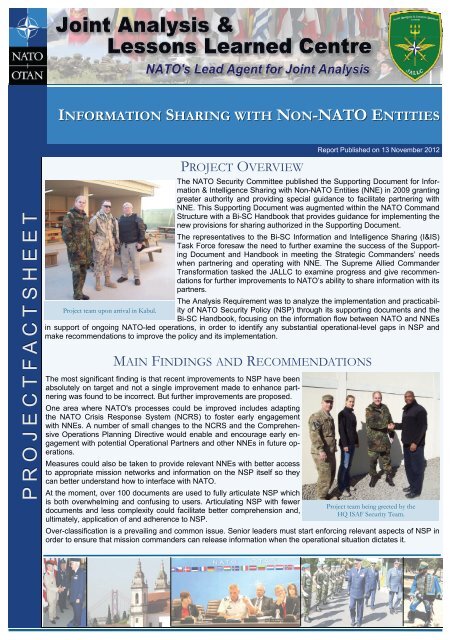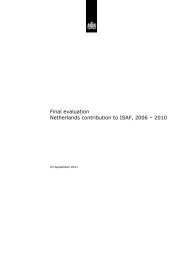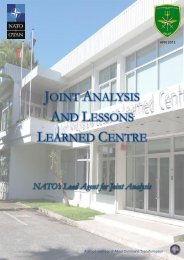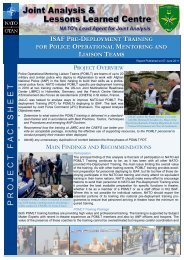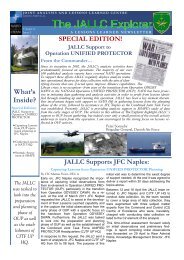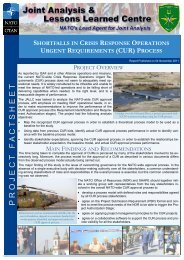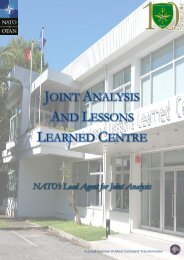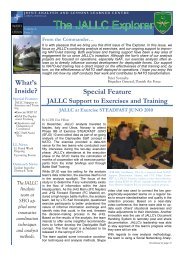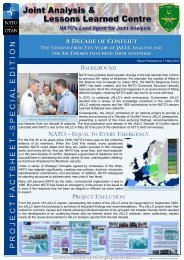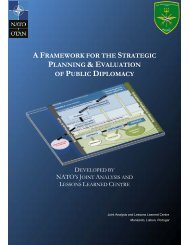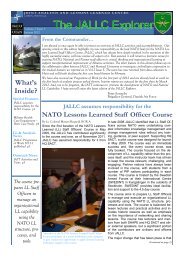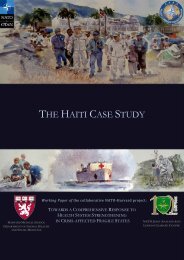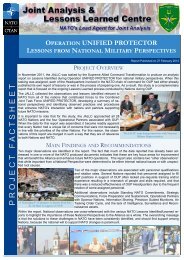Information Sharing with Non-NATO Entities - Joint Analysis and ...
Information Sharing with Non-NATO Entities - Joint Analysis and ...
Information Sharing with Non-NATO Entities - Joint Analysis and ...
Create successful ePaper yourself
Turn your PDF publications into a flip-book with our unique Google optimized e-Paper software.
INFORMATION<br />
SHARING<br />
WITH NON<br />
<strong>NATO</strong> ENTITIES<br />
ON-<strong>NATO</strong> E<br />
P R O J E C T F A C T S H E E T<br />
PROJECT OVERVIEW<br />
The <strong>NATO</strong> Security Committee published the Supporting Document for <strong>Information</strong><br />
& Intelligence <strong>Sharing</strong> <strong>with</strong> <strong>Non</strong>-<strong>NATO</strong> <strong>Entities</strong> (NNE) in 2009 granting<br />
greater authority <strong>and</strong> providing special guidance to facilitate partnering <strong>with</strong><br />
NNE. This Supporting Document was augmented <strong>with</strong>in the <strong>NATO</strong> Comm<strong>and</strong><br />
Structure <strong>with</strong> a Bi-SC H<strong>and</strong>book that provides guidance for implementing the<br />
new provisions for sharing authorized in the Supporting Document.<br />
The representatives to the Bi-SC <strong>Information</strong> <strong>and</strong> Intelligence <strong>Sharing</strong> (I&IS)<br />
Task Force foresaw the need to further examine the success of the Supporting<br />
Document <strong>and</strong> H<strong>and</strong>book in meeting the Strategic Comm<strong>and</strong>ers’ needs<br />
when partnering <strong>and</strong> operating <strong>with</strong> NNE. The Supreme Allied Comm<strong>and</strong>er<br />
Transformation tasked the JALLC to examine progress <strong>and</strong> give recommendations<br />
for further improvements to <strong>NATO</strong>’s ability to share information <strong>with</strong> its<br />
partners.<br />
The <strong>Analysis</strong> Requirement was to analyze the implementation <strong>and</strong> practicability<br />
of <strong>NATO</strong> Security Policy (NSP) through its supporting documents <strong>and</strong> the<br />
Project team upon arrival in Kabul.<br />
Bi-SC H<strong>and</strong>book, focusing on the information flow between <strong>NATO</strong> <strong>and</strong> NNEs<br />
in support of ongoing <strong>NATO</strong>-led operations, in order to identify any substantial operational-level gaps in NSP <strong>and</strong><br />
make recommendations to improve the policy <strong>and</strong> its implementation.<br />
MAIN FINDINGS AND RECOMMENDATIONS<br />
The most significant finding is that recent improvements to NSP have been<br />
absolutely on target <strong>and</strong> not a single improvement made to enhance partnering<br />
was found to be incorrect. But further improvements are proposed.<br />
One area where <strong>NATO</strong>'s processes could be improved includes adapting<br />
the <strong>NATO</strong> Crisis Response System (NCRS) to foster early engagement<br />
<strong>with</strong> NNEs. A number of small changes to the NCRS <strong>and</strong> the Comprehensive<br />
Operations Planning Directive would enable <strong>and</strong> encourage early engagement<br />
<strong>with</strong> potential Operational Partners <strong>and</strong> other NNEs in future operations.<br />
Measures could also be taken to provide relevant NNEs <strong>with</strong> better access<br />
to appropriate mission networks <strong>and</strong> information on the NSP itself so they<br />
can better underst<strong>and</strong> how to interface <strong>with</strong> <strong>NATO</strong>.<br />
At the moment, over 100 documents are used to fully articulate NSP which<br />
is both overwhelming <strong>and</strong> confusing to users. Articulating NSP <strong>with</strong> fewer<br />
documents <strong>and</strong> less complexity could facilitate better comprehension <strong>and</strong>,<br />
ultimately, application of <strong>and</strong> adherence to NSP.<br />
Report Published on 13 November 2012<br />
Project team being greeted by the<br />
HQ ISAF Security Team.<br />
Over-classification is a prevailing <strong>and</strong> common issue. Senior leaders must start enforcing relevant aspects of NSP in<br />
order to ensure that mission comm<strong>and</strong>ers can release information when the operational situation dictates it.
P R O J E C T F A C T S H E E T<br />
P R O J E C T F A C T S H E E T<br />
The JALLC project team initially reviewed documentation on NSP, the<br />
supporting guidance, directives, doctrine, procedures, previous JALLC<br />
reports <strong>and</strong> open source material on information sharing <strong>with</strong> NNEs,<br />
followed up <strong>with</strong> research, video teleconferences <strong>and</strong> telephone conferences.<br />
Interviews were conducted <strong>with</strong> staff from comm<strong>and</strong>s, organizations <strong>and</strong><br />
units involved in ISAF or Operation UNIFIED PROTECTOR, as well as<br />
the International Committee of the Red Cross, United Nations Assistance<br />
Mission in Afghanistan <strong>and</strong> contractors.<br />
Data analysis involved a subjective review of all collected notes <strong>and</strong> interviews,<br />
on the basis of which further research <strong>and</strong> interviews were<br />
conducted to determine the root causes of the prevailing opinions. This<br />
allowed the team to determine where issues were caused by policy, implementation<br />
or inadequate training.<br />
COMMANDER MIKE KLEIBAUM, GERMAN NAVY<br />
PROJECT EXECUTION<br />
A Swedish staff officer illustrates how information<br />
flows from <strong>NATO</strong> to a partner Nation.<br />
PROJECT TEAM<br />
CDR Kleibaum is a comm<strong>and</strong> pilot <strong>with</strong> a background in Naval Aviation. After joining the JALLC as a military analyst<br />
in October 2010, he participated in various analysis projects <strong>with</strong> an operational focus. This project was his<br />
first assignment as a project manager. In September 2012, CDR Kleibaum assumed the position of the JALLC<br />
Advisory <strong>and</strong> Training team leader.<br />
LIEUTENANT COLONEL GORDON HAGAR, CANADIAN ARMY<br />
LTC Gordon Hagar has served at the JALLC as an analyst since July 2011 He has served as an armour officer<br />
<strong>and</strong> as a logistics officer in two service battalions <strong>and</strong> garrison units, is a graduate of the Royal Military College<br />
Kingston, <strong>and</strong> has successfully held sub-unit comm<strong>and</strong> at all previous ranks. He has been deployed to Rw<strong>and</strong>a<br />
(1995), Bosnia (2000), <strong>and</strong> Afghanistan (2002 <strong>and</strong> 2011), <strong>and</strong> has enjoyed exchange postings <strong>and</strong> courses in<br />
the United States, the United Kingdom, <strong>and</strong> on the European continent.<br />
MR DAVID ROSS, CIVILIAN ANALYST<br />
Mr Ross is a civilian analyst working for the JALLC. He has masters’ degrees in computer science <strong>and</strong> public<br />
service management <strong>and</strong> an undergraduate degree in mathematics. A retired US Air Force colonel, he spent 28<br />
years as an active duty officer, serving at all levels of comm<strong>and</strong>. He has extensive military <strong>and</strong> civilian experience<br />
in project management, C2 systems, capability development <strong>and</strong> intelligence support. Prior to joining the<br />
JALLC, Mr Ross served as a military advisor to Bosnia <strong>and</strong> Herzegovina for one year <strong>and</strong> to Albania for three<br />
years. Overall, he has more than 22 years of experience working in <strong>NATO</strong>, joint, <strong>and</strong> coalition environments.<br />
JALLC<br />
JOINT ANALYSIS AND LESSONS LEARNED CENTRE<br />
AVENIDA TENENTE MARTINS – MONSANTO<br />
1500-589 LISBON<br />
PORTUGAL<br />
PHONE: +351 21 771 7007/8/9<br />
FAX: +351 21 771 7098<br />
<strong>NATO</strong>’S LEAD AGENT FOR JOINT ANALYSIS<br />
All JALLC Reports, the LL Portal, <strong>and</strong> <strong>NATO</strong> LLDb Items may be<br />
found in their entirety under the Products section on the NS WAN:<br />
http://www.jallc.nato.int<br />
<strong>Non</strong>-classified reports <strong>and</strong> LLDb Items, Project FactSheets, the<br />
<strong>Joint</strong> <strong>Analysis</strong> H<strong>and</strong>book <strong>and</strong> Lessons Learned H<strong>and</strong>book can be<br />
found on JALLC’s Internet site at the same address.<br />
A proud member of Allied Comm<strong>and</strong> Transformation


